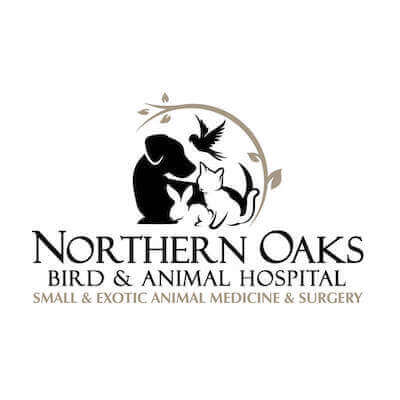What is involved in cat dental care?
That's a big question. So there are a couple of areas of this. One is the preventative care you can provide and the other is the care we can provide within our hospital. We perform a comprehensive oral health assessment and treatment, or co-hat, under anesthesia. During this procedure, we anesthetize your cat, take radiographs of all of the teeth and their roots to assess if there is damage. We can also assess the health of the teeth by probing, much like a human dentist, but a cat requires anesthesia for this.
Dr. Becka Byrd
Northern Oaks Bird & Animal Hospital
What happens after the probing and assessment?
Once we've probed and determined if there are pockets, we assess the roots with the x-rays and then we can determine if the teeth are healthy, if any of them need further care, or if they need extractions, antibiotics, or root planing. We then remove all the calculus, use an ultrasonic cleaner to clean them further and then polish them. This is imperative to keep our cats with healthy teeth and to keep those teeth lifelong.
How frequently should these procedures be performed?
We don't want to wait until we see tremendous amounts of tartar because at that point it's often too late. We want to do this preventatively annually because this is what helps our cats keep their teeth and keep them healthy. Remember we have to go to the dentist twice a year and we brush twice a day. Our cats aren't brushing every day and we need to clean their teeth at least once a year because that calculus is still going to build up and it causes the same damage.
What is the impact of dental health on a cat's overall health?
Teeth are a nidus for plaque and bacteria. That bacteria is there every time they swallow. This can affect their liver, their kidneys, their heart and it actually affects their lifespan. The cleaner their teeth, the longer they live. We know that it reduces years from their lives if they do not have proper dental cleaning.
What dental care can cat owners provide at home?
There are water additives that have chlorhexidine in them which is a little bit of an antiseptic for their teeth. You can brush their teeth at home, which is the best way to reduce plaque and calculus buildup, and you can also provide dental treats.
What are some signs and symptoms of oral health issues in cats?
Some of the signs and symptoms are severe mouth odor, visible calculus, dental inflammation on the gums, and a lot of buildup on the teeth. Occasionally, a cat may cry in pain or shy away from their dish. Loose teeth, drooling, decreased appetite, bleeding gums, bad breath, periodontal disease, tooth resorption, or gingivitis, these all need to be treated and assessed.
How do you diagnose dental problems in cats?
We diagnose their dental problems visually, by smell, and then under anesthesia by probing, by x-rays, and by examining the teeth. This cannot be done when they are awake.
What are the potential conditions caused by poor dental health in cats?
Poor dental health can lead to severe abscessed teeth, pain, infection, and other issues. That's why it's important to provide proper dental care and prevention. Thank you so much for your time.
If you still have other questions and you'd like to reach out to us, you can call us directly at (210) 496-1315, or you can email us at [email protected]. But please do reach out, and we'll get back to you as fast as we can. Don't forget to follow us on social media Facebook, Instagram
Cat Dental- FAQs 1
Dr. Becka Byrd
Northern Oaks Bird & Animal Hospital
What is involved in cat dental care?
Cat dental care involves preventative care by pet owners and comprehensive care by professionals at the hospital. As professionals, we conduct a comprehensive oral health assessment and treatment, also known as a co-hat. This is done under anesthesia and involves taking radiographs of all the teeth and their roots to assess any damage. We also probe the teeth to determine their health, and based on the findings, we determine if any teeth need further care, extractions, antibiotics, or root planing. After this, we clean and polish the teeth.
How does cat dental care impact the overall health and well-being of a cat?
The cleanliness of a cat's teeth directly impacts its overall health and lifespan. Unhealthy teeth become a breeding ground for bacteria, which the cat swallows and can affect its liver, kidneys, and heart. Hence, maintaining clean teeth can extend a cat's lifespan.
What dental care can pet owners provide at home?
Pet owners can use water additives that contain chlorhexidine, which acts as an antiseptic for their cat's teeth. They can also brush their cat's teeth at home to reduce plaque and calculus buildup and provide dental treats.
What are some signs and symptoms of oral health issues in cats?
Some signs and symptoms include severe mouth odor, visible calculus, inflamed gums, and buildup on the teeth. In some cases, cats may cry in pain or shy away from their food dish, which could indicate a specific type of dental disease. Other signs include loose teeth, drooling, decreased appetite, bleeding gums, bad breath, periodontal disease, tooth resorption, or gingivitis.
How do professionals diagnose dental problems in cats?
Dental problems in cats are diagnosed visually, by smell, and under anesthesia through probing, x-rays, and examination of the teeth.
What conditions can be caused by poor dental health in cats?
Poor dental health in cats can cause severe abscessed teeth, pain, infections, and other health issues. Therefore, it is crucial to prevent these by providing proper dental care and prevention.
If you still have other questions and you'd like to reach out to us, you can call us directly at (210) 496-1315, or you can email us at [email protected]. But please do reach out, and we'll get back to you as fast as we can. Don't forget to follow us on social media Facebook, Instagram




